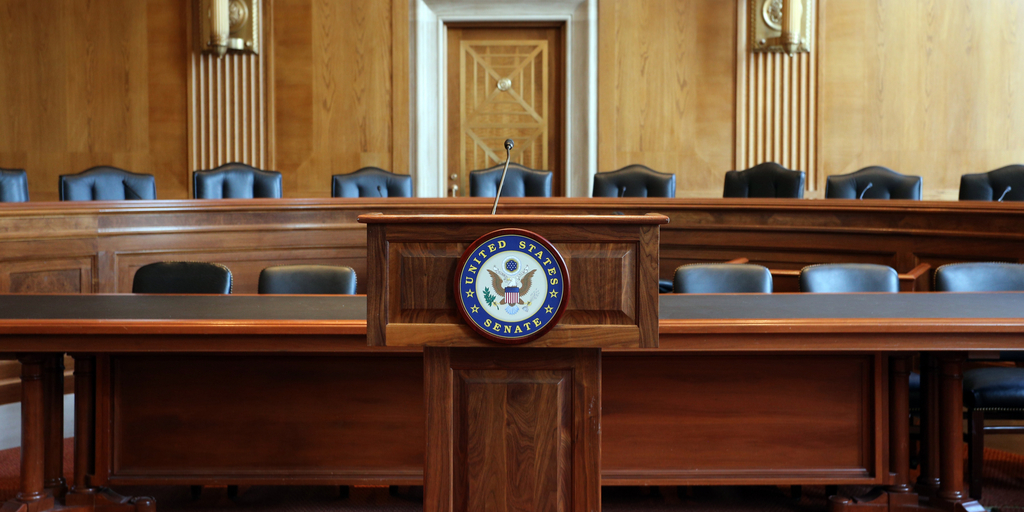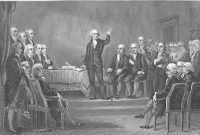The filibuster may have some costs, but it makes our polity more stable, promotes bipartisan compromise, tamps down polarization, and protects federalism.
Bipartisan Reform in a Fitful Senate?
Back in the antediluvian era of late February 2020, a group of 70 former U.S. Senators took to the opinion page of the Washington Post to lament the sorry state of America’s upper legislative chamber. Self-identified as 48 Democrats, 18 Republicans, and 4 independents (though these identifications don’t always match what they used when in office), the group’s open letter attempted to sound an alarm about Congress’ dereliction of its constitutional duties. And they offered a solution: “the creation of a bipartisan caucus of incumbent senators who would be committed to making the Senate function as the Framers of the Constitution intended.”
Just a month later, the Senate proved capable of working out a $2 trillion bipartisan salve for the economic damage inflicted by the coronavirus pandemic, passing it 96-0. How’s that for a bipartisan caucus?
The former senators’ letter presumed that the Senate was hopelessly mired in inaction—though they were maddeningly vague about why. As my colleague James Wallner pointed out, they strained heroically in their insistence on the passive voice, the better to avoid assigning blame. Presumably that was the cost of assembling a genuinely bipartisan group of signatories. But their talk of committee work marginalized, floor debate curtailed, and filibusters run amuck, made it seem as if these conditions had spread out through the upper chamber with no more human agency than a virus.
They proposed to inoculate the chamber to further dysfunction by means of a bipartisan power play:
We believe a bipartisan caucus of incumbent members that promotes a fair opportunity for senators to participate in meaningful committee work as well as on the Senate floor could help restore the Senate to its essential place in our constitutional system. Its members would need to stand firm in the face of what could be strong opposition from partisans who prefer politicians who take intransigent positions over those who champion a legislative process that celebrates compromise.
These two awkward sentences revealed much about the reform mindset that the letter’s actual writers (whoever they may be) brought to their endeavor. Their aim was not the vindication of some abused portion of the public. Not the accomplishment of some particular policy goal. Not even a clear change to the Senate’s own procedural practices or precedents. Instead, they wanted to see senators “participate” both in “meaningful committee work” and in debates on the Senate floor. This participation would “help” the Senate take up its essential place in the constitutional order.
But in the very next sentence, the writers hurriedly disavowed any suggestion that they are making a “judgment on today’s Senate leadership.” They wanted members from both parties to embrace the emergence of this caucus as “a bipartisan act of shared responsibility and accountability for how we arrived at this point.” But they took refuge in abstractions here precisely where they would need to be specific if their reform movement were to have traction.
We should consider the possibility that, at least in our pre-coronavirus innocence, getting money out the door was enough to satisfy our current crop of Senators.
To give a sense of how a process-oriented reform movement might actually succeed, let us consider one of the most famous reform triumphs in the history of Congress: the overthrow of Speaker Joseph Cannon in March 1910. During the decade of the 1900s, Boss Cannon, as he was commonly known, dominated the House of Representatives quite thoroughly. He directly chaired the Rules Committee, which ensured that very little of substance was ever debated on the House floor. He also exercised absolute domination over committee assignments, and indeed often exercised practical control of the bills reported out of committees. He thereby maintained a remarkable degree of partisan unity even as Republicans divided into more progressive and conservative wings. Finally, though, progressive George Norris of Nebraska broke his hold on the chamber.
By his own account, Norris came to Washington as a “bitter Republican partisan” in 1903, prepared to support his party unwaveringly. “I believed that all the virtues of government were wrapped up in the party of which I was a member, and that the only chance for pure and enlightened government was through the election of only Republicans to office.” But he soon found that the leaders in whom he was prepared to put his faith were “guilty of virtually all the evils that I had charged against the opposition.” Norris became convinced that the leaders were running the House for the benefit of special interests, and found that this sentiment was shared by a number of other members of his party. In 1910, he secretly organized a bloc of “insurgent” Republicans committed to depriving the Speaker “of the vast, brutal power which the rules of the House gave him to control the action of individual members.”
Then, without any warning even to his allies, he seized an opportunity for reform with a daring parliamentary procedure. The chair had, over many objections, just ruled that a census bill could be recognized out of turn because it contained a Constitutional provision. Norris got himself recognized and proposed a change in the structure of the Rules Committee, which he said had Constitutional import because of the declaration in Article I, Section 5 that “Each House may determine the rules of its proceedings.” Predictably, he was ruled out of order, but he appealed to the full House. With insurgents and Democrats combining their votes, Cannon was defeated even after managing to hold the vote open for some 26 hours. Thereafter, the full House would elect the members of the Rules Committee, depriving the Speaker of his most potent tool of control of the House floor. Democrats won control of the chamber in that year’s midterms, and Norris went on to spend thirty years in the Senate.
This successful insurrection ought to teach today’s would-be reformers several lessons. First, Norris and his allies were motivated by a sense that their particular leadership had betrayed key values, including the prioritization of the commonweal, and they were therefore out to take power away from that leadership. There was no pretense of blamelessness or “shared responsibility.” As Norris saw it, Cannon and his cronies had become tyrannical and were due to be taken down a peg.
Second, in executing their insurgency, the progressive Republicans sought a specific and significant change in the structure of their chamber—the reorganization of the House Rules Committee. They did not set out a vague demand for better treatment. Had they done so, they would have been inviting Cannon to lead them on with empty promises while simultaneously peeling off members from their group.
Third, though the tensions between progressives and stalwarts were well-known, Norris and his allies nevertheless succeeded in large part because they possessed the element of surprise. As Norris saw it, “It was Mr. Cannon’s genuine confidence in party discipline that made him so fearless; and this confidence was his undoing.” When Norris made his motion, the Speaker was quite unprepared, giving him little chance to use the many tools at his disposal.
When we return to the situation of the contemporary Senate, then, there are a few key questions that the former Senators’ letter obscured more than illuminated. Namely, is Senate Majority Leader Mitch McConnell’s rein so manifestly oppressive to Senators that they are willing to hatch a revolt? Which Republicans have strong legislative priorities that they believe McConnell is thwarting? Or, to come at it from a different angle, whose ox is being gored because of the way that McConnell runs the Senate?
There might be any number of plausible answers to these questions. Certainly, the former Senators are not out on a limb in charging the current Senate with sitting on legislation that would address any number of pressing national issues, from immigration to the opioid crisis to climate change.
But the oft-heard lament that all the Senate does anymore is confirm the president’s executive and judicial appointments has never been true. The Senate under McConnell’s leadership has consistently (if sometimes rather dramatically) shepherded through the largest spending bills in the history of the Republic. The responses to the coronavirus (the first one, the second one, and the third one), which (understandably) take us to even more dizzying fiscal heights, have also vividly demonstrated how focused and speedy the leadership-dominant Senate can be when there is a powerful demand for action.
Conservatives, both fiscal and constitutional, have much to regret about the current order. The Senate’s reputation as the “world’s greatest deliberative body” is not matched by the reality in which all deals are routed through the leaders’ offices and floor amendments are practically squeezed out. Congress’ power of the purse comes to seem rather feeble when ramping up spending across the board becomes the accepted default. But we should consider the possibility that, at least in our pre-coronavirus innocence, getting money out the door was enough to satisfy our current crop of Senators.
In the strange new era we’ve entered, these members may find themselves deeply relieved to know that the responsibility for coping with the cataclysm of 2020 falls on the shoulders of McConnell, his counterpart, Minority Leader Chuck Schumer, House leaders, and, most of all, the White House. Executive empowerment and an open purse are nothing new in crises.
Perhaps the virus will have changed more about our political climate than we can yet fathom. If, in response to urgent new political demands, a group of Senators is roused to action on behalf of a less centralized chamber, just about the worst thing they could do would be to announce themselves as a bipartisan caucus in the manner advised by the 70 former Senators. They should, instead, figure out what exactly they want to change about the Senate’s procedures, quietly ascertain their true strength in challenging McConnell’s favored parliamentary rulings, and then strike without warning.
Stranger things have happened, but political reformers will likely wait out this crisis for their moment. When we finally arrive at that faraway, long-hoped-for time of renewed social nearness, who knows what Americans may demand from their legislature.



